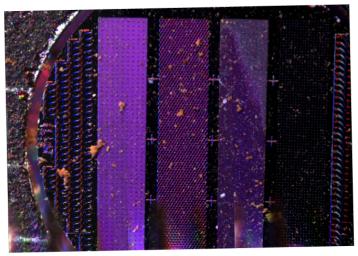
|
Martian Dust Collected by Phoenix’s Arm
- Click the image above for a larger view
- Full-Res JPEG (3860 x 2764) (918.9 kB)
- Full-Res TIFF (3860 x 2764) (32.0 MB)
Caption:
This image from NASA's Phoenix Lander's Optical Microscope shows particles of Martian dust lying on the microscope's silicon substrate. The Robotic Arm sprinkled a sample of the soil from the Snow White trench onto the microscope on July 2, 2008, the 38th Martian day, or sol, of the mission after landing.
Subsequently, the Atomic Force Microscope, or AFM, zoomed in one of the fine particles, creating the first-ever image of a particle of Mars' ubiquitous fine dust, the most highly magnified image ever seen from another world.
The Atomic Force Microscope was developed by a Swiss-led consortium in collaboration with Imperial College London. The AFM is part of Phoenix's Microscopy, Electrochemistry and Conductivity Analyzer instrument.
Background Info:
The Phoenix Mission is led by the University of Arizona, Tucson, on behalf of NASA. Project management of the mission is by NASA's Jet Propulsion Laboratory, Pasadena, Calif. Spacecraft development is by Lockheed Martin Space Systems, Denver.
Photojournal Note: As planned, the Phoenix lander, which landed May 25, 2008 23:53 UTC, ended communications in November 2008, about six months after landing, when its solar panels ceased operating in the dark Martian winter.
Cataloging Keywords:
| Name | Value | Additional Values |
|---|---|---|
| Target | Mars | |
| System | ||
| Target Type | Planet | |
| Mission | Phoenix | |
| Instrument Host | Phoenix Lander | Phoenix Mars Lander |
| Host Type | Lander | |
| Instrument | Microscopy, Electrochemistry, and Conductivity Analyzer (MECA) | |
| Detector | ||
| Extra Keywords | Color, Dust | |
| Acquisition Date | ||
| Release Date | 2008-08-14 | |
| Date in Caption | 2008-07-02 | |
| Image Credit | NASA/JPL-Caltech/University of Arizona/University of Neuchatel | |
| Source | photojournal.jpl.nasa.gov/catalog/PIA11038 | |
| Identifier | PIA11038 | |
